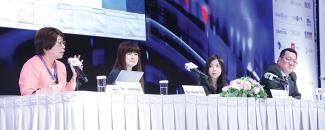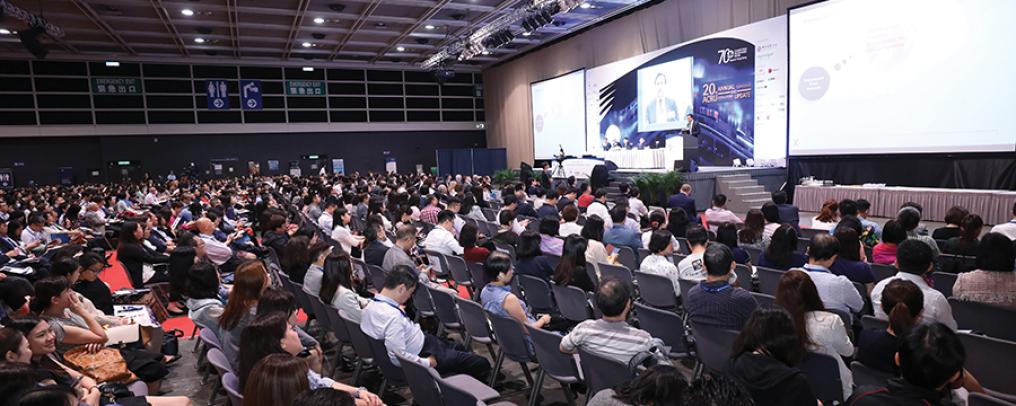
ACRU 2019 review (part two) – Your guide to the issues at the top of the governance agenda
This second part of our review of the Institute’s latest Annual Corporate and Regulatory Update (ACRU) takes a look at the guidance offered by regulators on the issues at the top of the agenda for governance professionals in Hong Kong.
The agenda of this year’s ACRU demonstrates that the governance environment in Hong Kong continues to grow in complexity. Speakers from four regulatory bodies discussed new developments relating to:
- listed issuer regulation
- environmental, social and governance (ESG) reporting
- anti–money laundering and counter–terrorist financing (AML/CTF) compliance, and
- proposed reforms to Hong Kong’s Mandatory Provident Fund system.
1. Listed issuer regulation
The regulation of listed issuers was a central focus for speakers from Hong Kong Exchanges and Clearing Ltd (HKEX). Kenneth Chan, Senior Vice-President, Listed Issuer Regulation, Listing Department, HKEX, emphasised that listed issuer regulation was at the heart of maintaining market quality.
‘We believe maintaining market quality is the key to market growth and sustainability and leads to a virtuous cycle,’ he said. He displayed a graphic to illustrate the way market quality leads to increased investor confidence, which in turn increases order flow and market liquidity, which in turn attracts quality listed issuers. He warned that where corporate governance standards are low the opposite can be true – the market goes into a vicious cycle where poor market quality leads to reduced investor confidence, order flow and market liquidity, which in turn results in quality listed issuers avoiding the market.
Mr Chan emphasised that maintaining market quality is not just a question for regulators – directors, both collectively and individually, need to fulfil their fiduciary duties and duties of skill, care and diligence.
He added that HKEX regards having an effective mechanism to delist poor quality issuers as critical for maintaining market quality. In this regard, he highlighted the HKEX delisting rule amendments which became effective in August 2018. The new regime is designed to facilitate efficient and orderly exits of poor quality issuers; provide certainty to the market on the delisting process; incentivise suspended issuers to act promptly towards resumption; and deter material breaches of the listing rules.
He emphasised that HKEX expects a suspended issuer, for trading resumption purposes, to promptly identify the relevant issues, and to devise a resumption plan with remedial actions and a timetable.
Sufficiency of operations and assets
Patrick Yu, Senior Vice-President, Listed Issuer Regulation, Listing Department, HKEX, focused his ACRU presentation on another market quality issue – the misuse of shell companies. The listing rules require listed issuers to maintain sufficient operations, or to have assets of sufficient value, to warrant their continued listing. HKEX has been cracking down on shell companies – where companies divest much of their business but maintain their listing only motivated by the value of their listed status – by tightening the application of the rules on sufficiency of operations and assets.
Mr Yu pointed out that HKEX applies a qualitative not a quantative test when assessing the sufficiency of operations and assets. HKEX does not apply a prescribed threshold for ‘sufficiency’, but looks for evidence as to whether the issuer’s business is viable and sustainable, and whether the business has substance. He warned that HKEX will suspend trading where issuers are deemed to have breached the sufficiency test, for example, where there is a very low level of operating activities and revenue, which is not the result of a temporary downturn in the market, or where assets do not generate sufficient revenue and profits.
Material intangible assets disclosures
Steve Ong FCA FCPA, Senior Vice-President, Head of Accounting Affairs, Listing Department, HKEX, also addressed listed issuer regulation in his ACRU presentation. His focus was on disclosures relating to ‘material intangible assets’ – one of the most challenging areas for issuers. Intangible assets – such as goodwill, customer relationships, research and development costs, software, technology know-how, trademarks, patents and licences – can form a significant part of issuers’ assets and disclosures relating to these assets have been drawing increasing investor interest.
Mr Ong emphasised that such disclosures should include information on management’s judgements and estimates relating to intangible assets. The provision of this information is key to proper financial reporting to enhance shareholders’ value whereby investors can readily obtain the required information to assess the company, he said.
He highlighted the findings of the HKEX Review of Issuers’ Annual Report Disclosure – Report 2018 (the HKEX Review) in the following three areas below.
- Disclosures on reasonableness of financial budgets and assumptions used in determining recoverable amounts on impairment testing for goodwill, particularly for loss-making segments.
- Disclosures on assessment of intangible assets with indefinite or long useful lives.
- Disclosures on accounting for business combinations, in particular whether intangible assets had been properly identified, separately recognised and measured at fair value.
In addition, the audit committee should get involved in reviewing judgements and estimates relating to intangible assets. Moreover, issuers should not rely solely on professional valuers or other experts without carrying out sufficient due diligence on valuations. Directors should also assess the competence, capabilities, objectivity and qualifications of professional valuers or other experts.
He emphasised that company secretaries have a great role to play to ensure that the ecosystem relating to financial reporting works for the listed issuer in enhancing shareholders’ value.
2. ESG performance and disclosure
Environmental themes featured more prominently in this year’s ACRU than in any previous year.
ESG compliance
Katherine Ng, Head of Policy, Listing Department, HKEX, discussed Hong Kong’s evolving ESG reporting framework and the current compliance standards of listed issuers. HKEX regularly assesses the ESG disclosure of Hong Kong listed issuers and its latest assessment report – Analysis of ESG Practice Disclosure 2016/2017 – found that, while overall compliance with the HKEX ESG Reporting Guide (Appendix 27 of the listing rules) (ESG Guide) is high, it is of ‘varying quality’.
The HKEX Review identified some areas of weakness – in particular, ineffective governance structures for the management of ESG issues and the lack of reporting on issuers’ materiality assessment process. In this regard, Ms Ng highlighted the HKEX proposals put forward in its Consultation Paper on Review of the ESG Reporting Guide and Related Listing Rules (ESG Consultation) published in May this year.
The ESG Consultation proposes revisions to the ESG Guide to require disclosure of a statement from the board in their ESG Reports setting out, among other things, the board’s oversight of ESG issues and how the board reviews progress made against ESG-related goals and targets. Issuers would also need to provide details of their materiality assessment process, including a description of:
- the significant stakeholders identified
- the process and results of the issuer’s stakeholder engagement (if any), and
- the criteria for the selection of material ESG factors.
Ms Ng pointed out that company secretaries should be playing a key role in improving listed issuers’ management of ESG risks and opportunities – for example, ensuring that ESG issues get board level attention, identifying a list of potential ESG issues and coordinating stakeholder engagement.
Finally, Ms Ng urged ACRU participants to make use of the resources available on the HKEX website, such as the new ‘E-training on ESG Governance and Reporting’.
Environmental and climate change-related disclosures
Environmental disclosure also featured highly in the Securities and Futures Commission (SFC) presentations at ACRU 2019. Kenneth Lau, Director, Corporate Finance Division, SFC, focused his presentation on climate change-related disclosures.
He started by sharing the news about the recent bankruptcy of a US gas and power company, which was reportedly the first major bankruptcy case attributable to climate change. This case illustrates how climate change can pose serious operational and financial risks to companies, and why disclosure of environmental issues should no longer be confined to pollution. Investors are expecting more disclosure of how a business might be affected by environmental or climate-change related issues.
Mr Lau then went on to review some of the key developments globally and locally in this space. For example, the Task Force on Climate-Related Financial Disclosures (TCFD), established by the Financial Stability Board, published a set of recommended disclosures in 2017, which provide a good framework that helps companies prepare climate change-related disclosures and identify climate-related risks, including physical risks and transitional risks. He explained that the TCFD Recommendations are not only about the disclosure of specific risks, but also more broadly, how climate risks are managed such that investors can assess whether the company is well prepared for the impact of climate change.
Mr Lau then turned to developments here in Hong Kong. In September last year, the SFC published a paper setting out a strategic framework for the development of green finance in the Stock Exchange of Hong Kong. One of the SFC’s priorities is to enhance listed companies’ environmental disclosure. The SFC has been working closely with the Stock Exchange on this front, including providing guidance and consulting the market on enhancing the listing rules requirements. He then reviewed the relevant disclosure requirements under the listing rules, the Companies Ordinance and the Securities and Futures Ordinance. He emphasised, however, that companies should be thinking beyond the compliance mandate because whether issuers can successfully manage climate-related risks and opportunities is likely to be of increasing importance for their future survival.
Mr Lau further explained how a business may be affected by climate change and shared some examples of multinational companies which received high ratings for their climate disclosures. These examples show that climate change can bring both risks and opportunities that have a significant financial impact on a business which is quantifiable in dollar terms.
Sustainable investing
Another key driver for better ESG integration and disclosure is the rising pressure from ESG-orientated investors. Linda Yiu, Director, Intermediaries Supervision Department, Intermediaries Division, SFC, focused her ACRU presentation on this issue. She emphasised that rising investor interest in ESG disclosures means that issuers with higher ESG standards will not only benefit from better risk management and potential returns but also better access to capital.
She acknowledged, however, that sustainable investing still faces many challenges. For example, there is a lack of quality and comparability of ESG data and insufficient disclosure of whether and how asset managers conduct sustainable investing. The SFC has various initiatives to contribute to the development of green finance in Hong Kong. ‘One of our priorities is to work on ways in which asset managers make it clear to investors how and to what extent they factor environmental criteria into their investment processes and risk assessments,’ she said. This is to minimise the possibility of loss of trust in green finance due to the perception of green-washing.
The SFC issued a circular in April 2019 to provide guidance to fund management companies on enhanced disclosures for SFC-authorised green or ESG funds.
The SFC has also launched a survey of asset managers in the Hong Kong market to better understand how asset managers integrate environmental and climate change factors into their investment and risk management processes. It intends to conduct a similar survey of asset owners and the survey outcomes will be taken into consideration in the formulation of appropriate policies, codes and guidelines.
3. AML/CTF compliance
High on the agenda of governance professionals in Hong Kong has been the implementation of Hong Kong’s new anti–money laundering and counter–financing of terrorism (AML/CFT) regime in March 2018. Three speakers from the Companies Registry (CR) discussed different aspects of the new regime for the benefit of ACRU attendees. The speakers made the point that, while the new compliance requirements may be seen as burdensome by some trust and company service providers (TCSPs), they are a crucial part of the endeavour to fulfill Hong Kong’s international obligations in AML/CFT compliance and to strengthen Hong Kong’s position as an international financial centre.
Significant controllers registers
Angelina Mok, Deputy Registry Manager (Registration), CR, addressed market uncertainties and concerns regarding the new requirements for companies in Hong Kong to maintain beneficial ownership information by way of keeping significant controllers registers (SCRs). Since the implementation of the SCR requirements in March 2018, there have been many questions regarding the new requirements. Ms Mok explained the legal definition of ‘significant control’, ‘registrable persons’ and ‘registrable legal entities’ in a chain of ownership and answered some common questions received by the CR. She also provided details of the enforcement actions, including site inspections, taken by the CR. From October 2018 to March 2019, for example, the CR issued 52 summonses for non-compliant cases and 78 default notices. She recommended ACRU participants go to the dedicated thematic section ‘Significant Controllers Register’ of the CR website (www.cr.gov.hk). In the meantime, ‘please be prepared for our visit and make ready the SCR together with relevant supporting documents for our inspection,’ she said.
Licensing regime for TCSPs
Roger Wong, Deputy Registry Manager (Trust and Company Service Providers), CR, discussed Hong Kong’s new AML/CFT requirements for TCSPs. Since the commencement of the Anti-Money Laundering and Counter-Terrorist Financing (Financial Institutions) (Amendment) Ordinance 2018 on 1 March 2018, introducing a licensing regime for TCSPs and extending the statutory AML/CFT requirements to them, the Registry for Trust and Company Service Providers has been established and a dedicated website for the licensing regime has been set up.
Three guidelines were published by the CR to provide guidance to TCSPs. Mr Wong reminded ACRU attendees that the guidelines provide guidance in relation to the licensing requirements and AML/CFT requirements for TCSPs. He urged ACRU attendees to familiarise themselves with these guidelines if they are TCSP licensees or intend to apply for a TCSP licence.
Mr Wong also reminded ACRU attendees of the statutory obligations of TCSP licensees and highlighted the enforcement measures being taken by the CR.
AML/CFT requirements for TCSPs
Under the Anti-Money Laundering and Counter-Terrorist Financing Ordinance (Cap 615) (AMLO), TCSPs also have to carry out customer due diligence (CDD) measures and comply with record-keeping requirements. Christy Yiu, Senior Solicitor (Trust and Company Service Providers), CR, focused her ACRU presentation on this area. She explained that the CDD measures must be carried out if the TCSP licensee suspects that the customer or the customer’s account is involved in money laundering or terrorist financing, and/or when the TCSP licensee doubts the veracity or adequacy of the information obtained during the CDD process. Moreover, CDD needs to be carried out before establishing a business relationship with the customer and/or before carrying out an occasional transaction involving HK$120,000 or above.
The CDD measures prescribed in Schedule 2 to the AMLO include: identifying the customer and verifying the customer’s identity, identifying the beneficial owner and the person purporting to act on behalf of the customer and taking reasonable measures to verify their identities, and obtaining information on the purpose and intended nature of the business relationship, if a business relationship is to be established. Ms Yiu emphasised that, if CDD requirements are not complied with, the licensee must not establish a business relationship or carry out an occasional transaction with that customer. If a business relationship has been established, it must be terminated as soon as reasonably practicable.
She also addressed the need for enhanced due diligence (EDD) in high-risk situations, such as where the customer is not physically present for identification purposes, or the customer or the beneficial owner of the customer is a politically exposed person.
Ms Yiu also highlighted other statutory requirements relating to money laundering, terrorist financing, financial sanctions, financing of proliferation of weapons of mass destruction and in relation to the obligation to report suspicious transactions.
4. Mandatory Provident Fund system reform
Hong Kong’s mandatory retirement system, the Mandatory Provident Fund (MPF), was launched in December 2000 and two speakers from the Mandatory Provident Fund Schemes Authority (MPFA) shared with ACRU attendees the MPFA’s proposed major overhaul of the system to bring it into the digital age.
eMPF
John Wan, General Manager (eMPF), MPFA, pointed out that in today’s world consumers increasingly embrace digital solutions in their daily activities. MPF scheme administration needs to keep up with this trend. MPF scheme administration is still predominantly paper-based, involving a considerable amount of manual work and is costly to operate. These problems are exacerbated by the vast number of scheme participants and MPF accounts – there are about 4.3 million scheme members, 9.8 million accounts in 30 MPF schemes and around 430 MPF funds. The fragmented user experience may demotivate many scheme members to actively review, manage and consolidate their MPF accounts.
To address these problems, the MPFA was entrusted by the HKSAR Government to design, develop and operate a user-centric eMPF Platform (Platform), which will standardise, streamline and automate MPF administration processes. The efficiencies to be gained by moving to the Platform should reduce overall costs, improve the user experience, improve accuracy, reliability and efficiency, and bring greater transparency and member engagement.
This is clearly no small project. The estimated cost of building the Platform infrastructure is around HK$3.4 billion. Once in operation, the estimated financial savings generated will be in the region of HK$22.5 billion to HK$23.6 billion over 20 years.
One of the critical success factors for the initiative is to have as many employers and members handling their MPF matters via the Platform. Mr Wan called upon ACRU participants to make more use of the existing electronic tools and services provided by MPF trustees and go digital in order to make the transition to the Platform in future more seamless.
‘None of the previous reforms to the MPF system can compare to the eMPF Platform,’ Mr Wan said. ‘This is about moving the MPF system to a new era.’
MPF tax concessions
Germaine Lee, Senior Manager (Policy Development), MPFA, focused her ACRU presentation on the government’s newly launched tax concessions on tax deductible voluntary contributions (TVCs) to encourage voluntary savings for retirement. Ms Lee explained the key features of TVC and the tax savings that can be made by making TVCs to MPF schemes under the new legislation – the Inland Revenue and MPF Schemes Legislation (Tax Deductions for Annuity Premiums and MPF Voluntary Contributions) (Amendment) Ordinance 2019, which was enacted on 29 March 2019. The tax concessions for TVCs were implemented on 1 April 2019.
The 20th Annual Corporate and Regulatory Update (ACRU) of The Hong Kong Institute of Chartered Secretaries was held on 5 June 2019 at the Hong Kong Convention and Exhibition Centre.


